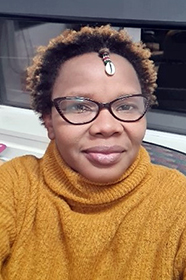 Tel +64 3 470 3579
Tel +64 3 470 3579
Email ndaan548@student.otago.ac.nz
Angella is a PhD student at Centre, based in the Maaratech Project. She currently focuses on Agricultural technology, climate change and sustainable development. Her aim is to contribute to the design, modification and implementation of appropriate policies, that would ensure sustainable balance between economic growth, social development and Sustainable environment. Angella was born in Kenya and holds a Master of Public Policy in Policy Analysis, The Australian National University, Australia; 2015 class, Master of Arts – Missions, Africa International University, Kenya, 2010 class and Bachelor in Education, Mathematics and Chemistry, Kenyatta University, Kenya, 2002 class.
Angella's research interests include:
- Public Policy
- Agricultural technology and society
- Social dimensions of Climate Change
- Social Inclusion
Research
Artificial Intelligence in Agriculture under the lens of Environmental sustainability: Case of MaaraTech Project
Angella's research will be based within the Aotearoa New Zealand-based MaaraTech project which is considering the application of Artificial Intelligence and Robotics in primary production in New Zealand.
Artificial intelligence (AI) and robotics research has gained global momentum, with many powerful economic and state actors promoting 'smart technology' as 'the solution' to major global problems like climate change, food security, poverty, and conflict. However, without critical sociological interventions, these technologies often (re)produce the very social and environmental problems they are being designed to solve.
An emerging body of research highlights the carbon-intensive nature of AI and robotic design processes, their dependency on non-renewable mineral resources, and waste produced in their design, use and disposal phases. While most AI and robotic technologies are referred to as 'green', and may help in addressing issues related to environmental sustainability, there are gaps in how this might be realised in practice.
Drawing on Jasanoff's conceptualisations of sociotechnical imaginaries and Haraway's studies on situated knowledge, her research will explore how environmental sustainability is imagined and practiced by a variety of actors who regulate, design, or use agricultural technologies.
Her research will weave together insights shared by technology regulators, designers, and users to provide recommendations on how to transform sustainability imaginaries about new agricultural technologies into sustainability practices which have positive environmental and social outcomes.
Supervisors
- Professor Hugh Campbell (Sociology, Centre for Sustainability)
- Dr Karly Burch (University of Auckland)
Publications
Ndaka, A. K. (2023). Sustainable AI techno-futures? Exploring socio-technical imaginaries of Agtech in Aotearoa New Zealand (PhD). University of Otago, Dunedin, New Zealand. Retrieved from http://hdl.handle.net/10523/16466
Williams, H., Smith, D., Shahabi, J., Gee, T., Nejati, M., McGuinness, B., … O'Connor, M., Gounder, S., Ndaka, A., … MacDonald, B. A. (2023). Modelling wine grapevines for autonomous robotic cane pruning. Biosystems Engineering, 235, 31-49. doi: 10.1016/j.biosystemseng.2023.09.006
Ndaka, A. (2021). Practicing environmental sustainability in the design and adoption AI and robotic technologies. Proceedings of the Sociological Association of Aotearoa New Zealand (SAANZ) Conference: Sociology in the 21st Century: Wellbeing, Engagement and Sustainability. (pp. 33). Lincoln, New Zealand: Department of Tourism, Sport and Society, Lincoln University. Retrieved from https://www.saanz.net/saanz-conference-2021
Ndaka, A. K. (2017). Informal sector and taxation in Kenya: Causes and effects. International Journal of Law, Humanities & Social Science, 1(4), 77-86.
Ndaka, A. K. (2017). Rethinking the conflict of interest policy in Kenya. International Journal of Law, Humanities & Social Science, 1(2), 58-63.
